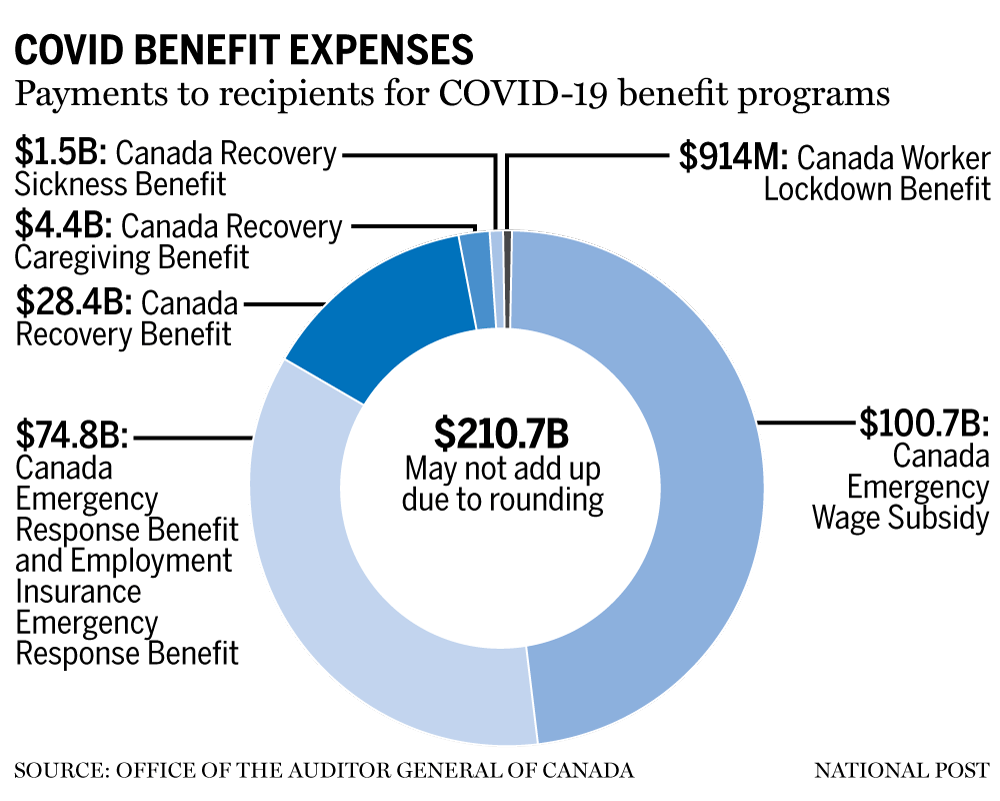COVID-19 benefit cheques. Scotiabank says the generous benefits likely fuelled excess demand in the economy. PHOTO BY PETER J. THOMPSON/NATIONAL POST
Auditor general finds a 'minimum' of $27.4 billion in suspicious COVID benefit payments
Auditor general says CRA's 'lack of rigour' in CERB and other pandemic benefits recovery efforts means majority of overpayments not likely to be recovered
Publishing date:
Dec 06, 2022 •
Article content
OTTAWA – Canada’s auditor general says a “minimum” of $27.4 billion in suspicious COVID-19 benefit payments need to be investigated because the government did not manage the aid programs efficiently, and it will likely fail to recover “significant” amounts in overpayments.
Article content
That’s in addition to $4.6 billion in confirmed government overpayments solely in double-dipping applications for the various COVID-19 aid programs launched within the first months of the pandemic, according to a new report by Auditor General Karen Hogan published Tuesday.
The 92-page report highlights the government’s success in setting up six aid programs that doled out a total of $210 billion to individuals and companies quickly in response to the COVID-19 pandemic and ensuing lockdowns.
But it’s extremely critical of the government’s management of the programs and ensuing efforts to find and claw back overpayments.
“The Canada Revenue Agency and Employment and Social Development Canada did not manage the selected COVID‑19 programs efficiently given the significant amount paid to ineligible recipients, the limited adjustments as programs were extended, and the slow progress on post‑payment verifications,” the report concludes.
Article content
But National Revenue Minister Diane Lebouthillier argued Tuesday that some of Hogan’s numbers are “exaggerated”, namely regarding Canada Emergency Wage Subsidy (CEWS) payments that should be investigated further.
“The agency does not agree with the auditor general’s calculation regarding ineligible recipients of the wage subsidy. The agency’s real verifications indicate that compliance with the subsidy was high, and that the auditor general’s figures were exaggerated,” she said in response to opposition questions Tuesday.

During a press conference, Hogan said she was “concerned” by CRA’s and ESDC’s “lack of rigour” in their efforts to identify and recoup overpayments from the half-dozen COVID-19 aid programs she audited. She called on the government to “act now” before it’s too late (the law limits eligibility verification to 36 months after payment).
Article content
“The number of post payment verifications included in the plan is insufficient to address all payments at risk of being ineligible,” she said.
Her report criticizes both organizations for “the significant amount paid to ineligible recipients, the limited adjustments as programs were extended, and the slow progress on post‑payment verifications.”
Hogan’s latest report is her first dive into the $210 billion in payments made via the government’s six COVID-19 financial aid programs, with the most generous being the $100 billion Canada Emergency Wage Subsidy, the $74.8 billion Canada Emergency Response Benefit (CERB) and the $28.4 billion Canada Recovery Benefit (CRB).
Many of the programs, but particularly the $2,000-per-month CERB that was launched in April 2020, were designed to urgently get money into Canadians’ pockets by setting aside the usual pre-payment verifications.
Article content
Hogan said the programs “quickly offered financial relief to individuals and employers, prevented a rise in poverty, mitigated income inequalities, and helped the economy to recover from the effects of the pandemic”.
But that’s about where her praise ended.
Her report notes there are at least $27.4 billion in suspected ineligible payments that CRA and ESDC let through over the six programs that now need to investigate on top of the $4.6 billion in overpayments it has already identified and is trying to claw back.
And that’s just the tip of the iceberg, Hogan warns. The report chronicles a separate series of eyebrow-raising CERB payments, such as $1.6 billion to individuals who appear to have quit their jobs (instead of losing it due to COVID-19), $6.1 million to incarcerated recipients and $1.2 million in payments to dead people.
Article content
In the case of CEWS, the report estimates that there are $15.5 billion in suspected overpayments to ineligible companies, based on a comparison of their HST and GST filings before and during the pandemic. CRA has previously contested this method of calculation as overbroad and inaccurate.
Hogan also discovered CRA doesn’t have the data to measure the program’s overall objective: getting companies to retain or rehire employees during lockdowns.
In a joint statement, Ministers Diane Lebouthillier (CRA) and Carla Qualtrough (ESDC) celebrated Hogan’s findings about the positive impacts of the programs all the while stating that the government would pursue a “compassionate” and “responsible” approach to recouping overpayments and catching fraudsters.
Article content
The Conservatives denounced the lack of transparency or “proper plan” to fix the “lack of control” by the government over its pandemic program disbursements.
“Conservatives are calling on the Liberals to present the plan that shows that they’re going to take this report seriously and put in the controls that Attorney General is also calling for,” said CPC MP Adam Chambers.
In her recommendations, Hogan pushes CRA and ESDC to increase their post-payment verifications to capture all possible ineligible payments.
That drew an exceptional response from the government, who only “partially agreed” because it believes it would not be “cost effective” nor “best practices” to go after “100 % of all potentially ineligible claims.”
During her press conference, Hogan pushed back. “My advice to them is if they wanted to make a decision about recovery, one that might either forgive payments or be empathetic, then that’s something they should be clear and transparent to with Canadians. But current legislation would require them to follow up with those individuals in recovery.”
By : Christopher Nardi
https://nationalpost.com/author/chrisgnardi/.
BECAUSE WE LIKE THE TRUTH













